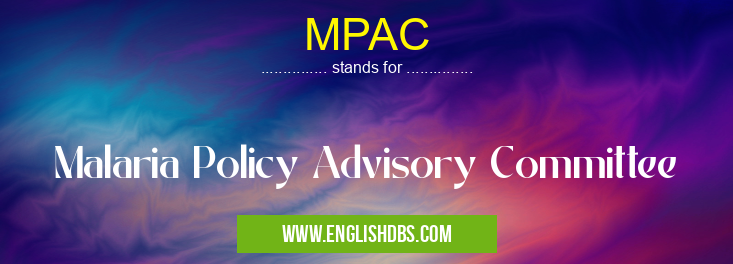What does MPAC mean in COMMITTEES
MPAC stands for Malaria Policy Advisory Committee. It is a vital body that plays a crucial role in providing expert advice and guidance on malaria policies to national malaria control programs and other stakeholders.

MPAC meaning in Committees in Community
MPAC mostly used in an acronym Committees in Category Community that means Malaria Policy Advisory Committee
Shorthand: MPAC,
Full Form: Malaria Policy Advisory Committee
For more information of "Malaria Policy Advisory Committee", see the section below.
» Community » Committees
Purpose and Functions
The primary purpose of MPAC is to:
- Provide evidence-based advice to policymakers on malaria control and elimination strategies.
- Review and assess malaria control programs and policies to identify areas for improvement.
- Develop and promote best practices for malaria prevention and treatment.
- Monitor the progress of malaria control efforts and make recommendations for adjustments.
- Foster collaboration and coordination among various stakeholders involved in malaria control.
Composition
MPAC typically consists of experts in the field of malaria, including:
- Malaria scientists and researchers
- Public health officials
- Representatives from non-governmental organizations (NGOs)
- Community representatives
- Members from affected communities
Activities
MPAC conducts regular meetings to discuss and deliberate on malaria policies. Its activities include:
- Reviewing and analyzing data on malaria prevalence and trends.
- Identifying and addressing gaps in malaria control programs.
- Developing recommendations for policy interventions and strategies.
- Monitoring the implementation and impact of malaria control measures.
- Providing technical support to national malaria control programs.
Essential Questions and Answers on Malaria Policy Advisory Committee in "COMMUNITY»COMMITTEES"
What is the Malaria Policy Advisory Committee (MPAC)?
The Malaria Policy Advisory Committee (MPAC) is an independent advisory body to the World Health Organization (WHO) that provides evidence-based advice on malaria policy and strategy. It is composed of experts in malaria research, control, and policy from around the world.
What are the responsibilities of the MPAC?
The MPAC's primary responsibility is to provide guidance to WHO on malaria policy and strategy. This includes advising on the development of global malaria strategies, evaluating the effectiveness of existing strategies, and making recommendations for future research and action. The MPAC also provides technical support to WHO and other organizations working on malaria control.
How is the MPAC composed?
The MPAC is composed of 15-20 experts in malaria research, control, and policy. Members are selected by WHO based on their expertise and experience in malaria control. The MPAC is chaired by a senior WHO official.
How often does the MPAC meet?
The MPAC meets twice a year. The meetings are held in different locations around the world.
What are the outputs of the MPAC?
The outputs of the MPAC include policy briefs, technical reports, and recommendations. These outputs are disseminated to WHO and other organizations working on malaria control.
How can I access MPAC's outputs?
MPAC's outputs are available on the WHO website.
Final Words: MPAC is a critical component of malaria control efforts. It provides expert guidance and support to policymakers, helping to ensure that malaria control programs are effective and sustainable. By working collaboratively with various stakeholders, MPAC contributes to the global goal of eliminating malaria.
MPAC also stands for: |
|
| All stands for MPAC |
